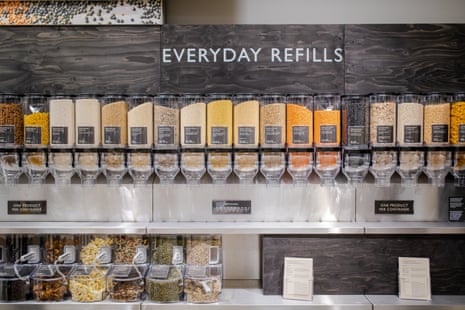Waitrose’s experiment in packaging-free shopping is an obvious win for the supermarket chain. Its decision to sell around 200 loose lines to shoppers at its Oxford store – they can now use their own containers to take home rice, pasta, lentils, cleaning products – will be catnip (now dispensed in self-service hoppers, presumably?), to ethical shoppers. The move co-opts the trend for “unpackaged” seen in more radical zero-waste shops and the rise of refillable wine and beer (growler-fills in Waitrose!). It ticks some useful, hip boxes for this rather stuffy middle-class brand.
It is all positive PR and puts Waitrose on par with rival supermarkets who, facing predicted “polluter pay” legislation (more on that later), are suddenly super-keen to prove their green packaging credentials. Market-style loose vegetable aisles are being rolled out at Booths; Asda has removed the plastic wrap from its swedes; Morrisons has unsheathed its cucumbers (for part of the year); and both Iceland and Tesco are trialling schemes to pay customers to recycle plastic bottles (5.5bn worth of which are currently burned or dumped annually). Tesco is even experimenting with collecting and recycling “soft plastics” such as crisp packets, which local authorities generally cannot reprocess.
Waitrose is discounting its unpackaged goods too, a bonus for those of us who shop there (full disclosure: me. I go there and to the Co-op because they are at least employee-owned – all caveats fully acknowledged). Behaviourally, Waitrose appears to be pushing at an open door here, too. A decade ago, when the campaigning group, Wrap, looked at consumer attitudes to unpackaged products, it found that hygiene concerns were less important than the public’s disgust about overpackaging. Ninety per cent of us already happily buy loose fruit and vegetables.
But instead of celebrating this change, it feels to me like another of those fashionable supermarket spasms (trials selling misshapen veg; pushes on unfashionable sustainable fish like mackerel), that will ultimately change little. It will achieve traction with an already self-motivated minority, but then what?
Realistically, how practical is unpackaged for most people? Keeping a bag for life handy at all times is difficult enough (and, such are the unintended consequences that can arise, some worry they have actually increased the total amount of bag-plastic in circulation). But imagine the hassle of planning and carting – by car, inevitably – endless (plastic?) containers to Waitrose. For dry goods, wouldn’t providing heavy-duty, reusable and recyclable paper sacks in-store be more user-friendly? And is any of this a truly sustainable model: driving to Waitrose to refill on frozen fruit because we want to eat strawberries in February? If so, where is the scientific audit, the full life-cycle analysis of all those interlocking energy uses, that proves it?
If you want to reduce Britain’s carbon footprint, surely a far more radical overhaul is needed? One that, for instance, evenly distributes big supermarkets (not local and metro spin-offs), so that, using their economies of scale and logistical might, we all have access to affordable food where we live. Enabling us to shop little and often (using refillables, preferably), without driving. That would go hand-in-hand with a generational schools programme teaching people how to plan meals and shop carefully, to minimise food waste.
Investment in sustainable food packaging, such as Apeel Sciences’ edible coating for avocados, is important, too. Removing plastic is great in immediate pollution terms, but if it leads to increased food waste – Morrisons unpackaged cucumbers have a shelf-life of five rather than seven days – many experts would tell you that, in carbon-footprint terms, food waste causes the greater damage.
That lack of joined-up thinking is most glaring in the recycling market itself where local authorities (or the taxpayer) shoulder 90% of the cost of waste recycling in a system so flawed that two-thirds of all our waste plastic is shipped overseas. Instead of being managed nationally for the greater good, the recycling market fluctuates, driving or curtailing innovation haphazardly and leaving huge technological holes in what can be recycled, where. That is why Costa Coffee is subsidising coffee-cup collections, at £70 a tonne, in an attempt to kickstart the market in recycling coffee cups and their problematic plastic linings.
The government, meanwhile, prevaricates. Plans announced in 2018 to make the food industry pay £1bn each year to recycle the waste packaging it creates (currently councils spend £700m annually on recycling, business just £73m), are out for consultation and years from implementation. It is “too little, too slowly”, said Labour MP Mary Creagh, chair of the environmental audit select committee.
Take the onus off the consumer. Make supermarkets pay for their waste, immediately. Feed that money into recycling and, just as the sugar tax forced manufacturers to redesign their fizzy drinks, we will see supermarkets moving swiftly to innovate new packaging solutions. For now, they are just pootling around the edges of the problem.
